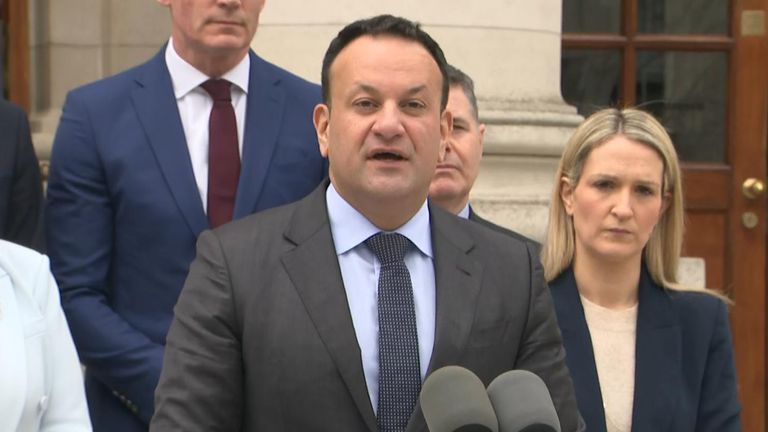Surprise Resignation: Leo Varadkar Exits as Taoiseach and Fine Gael Leader

Leo Varadkar, the Taoiseach and leader of Fine Gael, has announced his unexpected but welcomed resignation, marking the end of his tenure in both roles. In his address outside Government Buildings in Dublin, Varadkar expressed gratitude for the opportunity to lead the country, describing it as the most fulfilling time of his life. However, he stated that now was the right moment to step down, citing personal and political reasons.
Varadkar began his speech by reflecting on his extensive career in public service, spanning two decades as a public representative, 13 years as a member of cabinet, and seven years as leader of Fine Gael and Taoiseach of Ireland. He highlighted the significant milestones achieved during his tenure, including guiding Ireland from unemployment to full employment, navigating the country through economic challenges, and leading the response to the COVID-19 pandemic and Brexit.
“I’ve had the honor of helping to lead Ireland from unemployment to full employment, from a budget deficit to budget surplus. From austerity to prosperity, through a pandemic in which we saved lives and livelihoods, through Brexit, when we prevented a hard border between North and South, and protected our place in Europe,” Varadkar remarked.
He emphasized his administration’s commitment to advancing social reforms, including championing the rights of children, the LGBT community, and women’s equality, as well as addressing pressing issues such as affordable childcare, universal healthcare, and climate action. Varadkar also highlighted his government’s efforts to support the arts, culture, and sports sectors, increase international development spending, and expand Ireland’s diplomatic footprint globally.
“As Taoiseach, we reduced consistent poverty and income inequality, doubled housing construction, and welcomed over 100,000 Ukrainian refugees to our shores when they needed our protection,” Varadkar noted.
However, Varadkar acknowledged that challenges remained, and he expressed confidence in the government’s ability to address them under new leadership. He stressed the importance of knowing when to pass on the baton to someone else and acknowledged that the time for him to step down had arrived.
“When I became party leader and Taoiseach back in June 2017, I knew that one part of leadership is knowing when the time has come to pass on the baton to somebody else and then having the courage to do it. That time is now,” Varadkar declared.
He outlined his plans to resign as president and leader of Fine Gael immediately, with his resignation as Taoiseach to follow once his successor is ready to assume office. Varadkar expressed his confidence in the country’s future under new leadership and pledged to continue serving as Taoiseach until a new leader is elected. He concluded his speech by thanking his party, colleagues, constituents, and the people of Ireland for the opportunity to serve them.
“As Taoiseach, leader, and cabinet member since March 2011, I’ve learned so much, met so many people, and been to places I would never have seen. I am deeply grateful for it, and despite the challenges, would wholeheartedly recommend a career in politics to anyone who’s considering it,” Varadkar remarked.
Varadkar’s resignation marks the end of an era in Irish politics, an era that many have characterized as one marked by failure and disappointment. Across the country, there’s a palpable sense of relief among the Irish people at seeing him step down. As attention now turns to the selection of his successor, the legacy of Varadkar’s tenure will undoubtedly shape the future direction of Ireland. The challenges faced during his leadership, from housing crises to healthcare shortcomings, will serve as crucial lessons for those who follow in his footsteps. The Irish electorate’s verdict on Varadkar’s time in office will echo through the corridors of power, guiding the nation’s leaders as they navigate the path forward.








